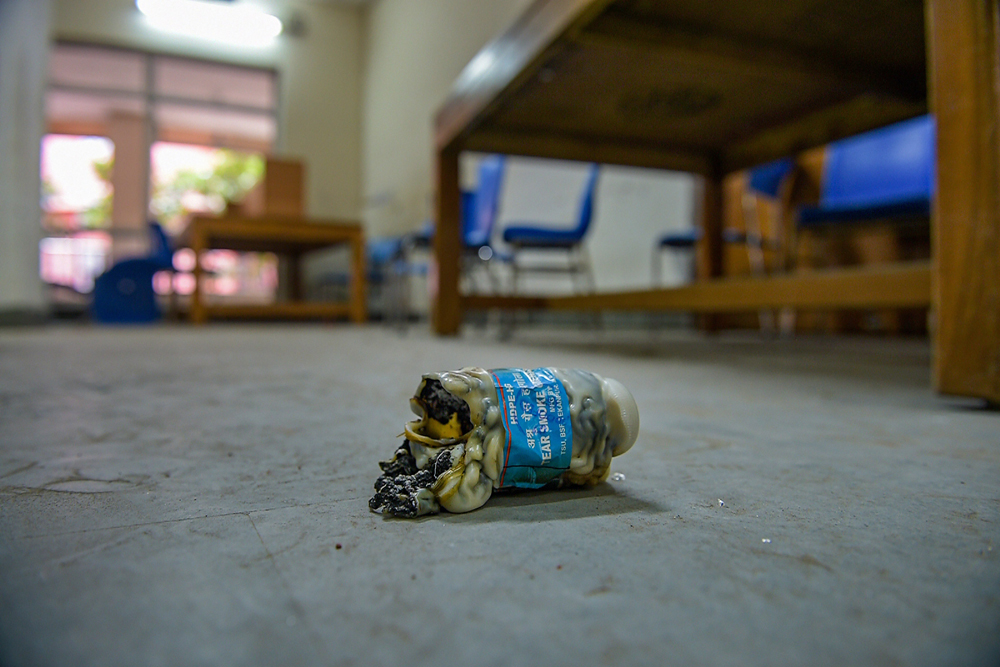Aligarh Muslim University (AMU) students want their vice-chancellor to resign in the aftermath of violence on campus, their demand in sharp contrast to sentiments of Jamia Millia Islamia where the administration has been praised for supporting those agitating against the Citizenship (Amendment) Bill, 2019.
After the brutal police crackdown in the university, Najma Akhtar, the Jamia vice-chancellor, had said she was deeply hurt at the way her students were targeted.
“Police ka campus me bina ijazat aana aur library me baithe huye innocent bacchon pe lathiyan barsana yeh mere liye bilkul acceptable nahi hai (The police entering without permission and then beating students with sticks are not acceptable),” she had said in a video statement.
Akhtar was, however, criticised for her initial statement to a news agency that the police couldn’t take permission amid the ruckus. She also said that the police couldn’t identify the troublemakers.
At a media conference on Monday, Akhtar said the university would file a case against the Delhi police. Waseem Ahmad Khan, Jamia’s chief proctor, confirmed on Wednesday that an FIR had been filed against the Delhi police.
On the other hand, the AMU vice-chancellor was criticised for allegedly unleashing the police on protesting students.
The Telegraph met the university officials who were monitoring the student protests since December 13 and had rescued those detained on the night of the police crackdown.
Large gathering
Khan maintained that the students were on the campus even as a large crowd covered the entire stretch of a road which runs through the university. He denied giving any permission, written or otherwise, to the Delhi police to enter the university.
“We didn’t see whether there were outsiders or not; we’ve been saying that they weren’t our students. Our students were detained from the campus,” said Khan. “If they show us proof incriminating our students, we won’t support them.”
Khan was at the main gate, Gate No. 7, along with his staff when tear gas was fired near them. He ran with professors and guards towards the proctor’s office.
A large number of surveillance cameras are installed at all facilities on the campus, including at the library. “When we saw the camera feeds after getting to the office, we saw that the police had already entered the campus from Gate No. 4,” said Khan. “A guard is posted there. They (police) were beating up the guard.”
However, the administration has been unable to release footage from the cameras, with some hoping that it can be done sometime in the future.
When the force entered the campus on Sunday night, they allegedly ensured that the cameras were broken and lights switched off. .
Khan saw a group helping people leave the campus, but the others were “brutal”. “Is this how students are to be punished?” he asked.
Call for probe
The Jamia administration, including the vice-chancellor and the registrar, has asked the Union ministry of human resources for a judicial inquiry.
On Tuesday, the Supreme Court had refused to hear the case until the destruction of public property was put to an end. The public property at the central university was allegedly destroyed by public servants.
The proctor’s office said that nearly 200 students were injured but clarified that not every student who was beaten up had gone to the hospital or come to them with complaints.
Assistant proctor Rafiullah Azmi, a teacher at the Centre for West Asian Studies, recalled how students were treated as criminals while in detention. Azmi said the policemen were extremely rude.
“If our brothers from other communities wouldn’t have gathered at ITO (in New Delhi) to protest, they were not in a mood to listen to give us basic things, such as meeting your own people,” said Azmi.
Another teacher, Shikha Kapur, of the department of adult and continuing education, called it a systematic attack on universities, especially public-funded varsities, and creating a larger divide between the haves and the have-nots.
“If you don’t fall in line, aap unko maroge, peetoge, unko blind karoge, langda karoge? (Will you beat them, blind them, maim them?),” said Kapur.
Kapur said the students were going to be traumatised for life.
Allegations of sexual assault of girl students on the same night have also surfaced. However, there hasn’t been a confirmation or denial from the administration.











